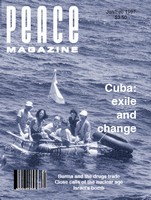
Peace Magazine Jan-Feb 1997, page 29. Some rights reserved.
Search for other articles by John Bacher here
Leonard Desroches. Editions Dunamis, 1996.
Allow the Water, like a rare handful of similar bold books by principled advocates of nonviolence, provides its readers with a treasure-house of inspiring stories not found in the mainstream media. It is an authentic example of a literature of a nonviolent counterculture, which empowers its readers with a refreshing vision of a war-free world.
Read Allow the Water, and you will find many jewels of discovery apparently discarded by the mainstream media as unfit to print. One of my favorite golden nuggets was learning about a boycott of Folger's Coffee organized by the peace group Neighbour to Neighbour. This boycott became a major factor in achieving the United Nations-mediated El Salvador peace accords.
Folger's was targeted because it was the largest United States buyer of coffee beans from El Salvador at a time when the death squads were financed by the country's coffee growers. After being the target of a major international boycott for 18 months following the murder of Jesuit peace workers, Folger's was finally prodded into action to support the peace process.
Desroches is visionary enough to imagine a world without armies, guns, or automobiles. He dreams on the big scale, but brings his suggestions close to home. These range from his own experiences of getting around on a bicycle to increasing community solidarity by organizing a neighborhood festival.
One of Allow the Water's proposed radical reforms is to have conflict resolution centres become common parts of neighborhoods, like fire stations. The aim would be to channel potentially destructive angers with a softer, community-oriented process.
While his message of hope may seem poetic, akin to St. Francis of Assisi's moving prayers to Mother Earth, Desroches strengthens it with detailed accounts of how he nurtured peace in difficult situations. He tells of achieving reconciliation in his own downtown Toronto neighborhood and dealing with guards at Toronto's Don Jail.
Getting better value for the $8 billion that Canada spends on its criminal justice system by instead using Gandhian techniques, is a suggestion typical of Desroches' mixing of the visionary with the nuts and bolts of real politics. In this regard he follows in the inspired but practical steps of one of his heroes, Co-operative Commonwealth Federation founder J. S. Woodsworth.
Another hard-headed suggestion is to take the $24 million now spent on military bands, and put it towards research on unarmed civilian defence for Canada. Or, alternatively, put 50,000 of Canada's 146,000 Department of National Defence employees to work at civilian defence.
Like a clear-thinking Jesuit scholar, Desroches is able to command an astonishing array of facts to the cause of his powerful vision of a peaceful and ecologically restored world. He points out that the risks people face for civil disobedience, even against tough dictators, are no greater than those experienced in driving a car - more Israelis have been killed on highways than in five wars against Arabs.
When reading Allow the Water, imagine it as a text that within a decade many will see as part of the process that sped us toward a peaceful world and a healed relationship with the planet. The many tragic consequences of war and the plunder of the planet he describes may become recognized as part of a brief dark age of the human condition.
Reviewed by John Bacher, a writer, environmentalist, and historian based in St. Catharines, Ont.

Peace Magazine Jan-Feb 1997, page 29. Some rights reserved.
Search for other articles by John Bacher here